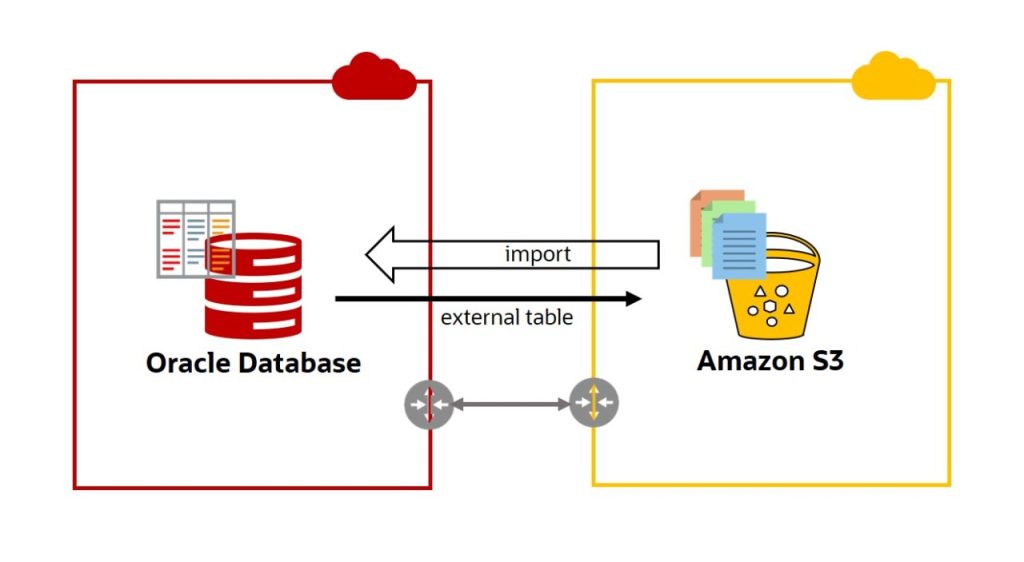In this post, we will go into the various intricacies of migrating databases from in-premises Oracle Database Management System to cloud-based Amazon S3 (Simple Storage Service). We will start with by evaluating the two entities separately and then understand why most data-driven organizations today are moving their databases from Oracle to S3.
Oracle Database Management System (DBMS)
Oracle is mainly used for Online Transaction Processing (OLTP). It is a proprietary multi-model relational database that was launched as an on-premises system. Lately, though, it has introduced columnar storage and technologies for on-cloud deployment along the lines of Amazon Simple Storage Service (S3).
Oracle has the distinction of being among the early database systems to operate on LINUX and GNU, running on different software and hardware configurations. Almost all common applications that are typically used can easily merge into the Oracle database. Most critically, being ACID-compliant, Oracle ensures a high degree of data integrity, security, and reliability.
Amazon S3 (Simple Storage Services)
While Oracle is an OLTP system, Amazon S3 is a cloud-based data warehousing system that is designed for Online Analytical Processing (OLAP). Any application can be seamlessly launched on Amazon S3 through a simple two-step process. First, the AWS Console or API calls are used to initiate an S3 cluster and then, connect the application to the S3 instance.
Given these metrics, why would businesses want to move their databases from Oracle to S3? It is because S3 provides increased data performance, data availability, scalability, and security. Among its other user-friendly attributes are the capability to backup, restore, and archive enterprise applications, big data analytics, and IoT devices. Apart from these features typical to a cloud-based environment, S3 offers an amazing data durability of 99.999999999.
Why migrate databases from Oracle to S3
Being based in the cloud, Amazon S3 offers several cutting-edge features that are exclusive to a cloud-based environment. Once we check them out, we can easily understand what benefits migrating databases from Oracle to S3 brings to the table.
- The cloud offers unlimited storage capabilities and you can download additional storage anytime. Hence, you do not have to expand your system and spend heavily on new hardware or software whenever there is a spike in demand.
- S3 provides high computing power. There is no degradation of database performance even when several users simultaneously execute complex queries.
- Users can seamlessly integrate data from several databases into the cloud effortlessly.
These are some of the main reasons why migrating databases from Oracle to S3 makes sense for organizations that want to take their operating efficiency to the next level.
Maximizing Oracle database operations on AWS (Amazon Web Services)
The immediate advantage of migrating databases from Oracle to S3 is the increase in performance and efficiency. Further, businesses save a lot on database operations as high payouts need not be made to Oracle for using the DMS. It is therefore recommended that when you move from Oracle to S3, it should be done entirely and not piecemeal.
Here are some of the ways you can maximize the value when you move databases from Oracle to the cloud ecosystem.
- Entirely move the Oracle database to the Amazon Relational Database Service which is a managed database platform for common database systems including Oracle.
- On the Oracle on-premises database system, run Elastic Block Store (EBS) and EC2 compute instance. Next, replace the existing servers and storage with the Amazon Web Service (AWS) setup.
- Finally, when you want to migrate the database Oracle to S3, you also have the option to move to Amazon Aurora. However, keep in mind that Aurora is not a feature-for-feature substitute for S3 even though it has several capabilities of the cloud environment.
How to migrate a database from Oracle to S3
There are two ways to migrate a database from Oracle to S3 and the approach selected by an organization depends on its specific needs.
- Import Data, Oracle Data Pump, and Amazon S3 bucket – Export Oracle source data with the Oracle DBMS_DATAPUMP package and dump the file in an Amazon S3 bucket. Download this file to the DATA_PUMP_DIR directory on the RDS Oracle DB instance. Finally, import and copy the data from the dump file to the Amazon RDS Oracle DB instance with the DBMS_DATAPUMP package.
- Import Data, Oracle Data Pump, and a Database Link – Use the Oracle Data Pump and the Oracle DBMS_FILE_TRANSFER package to link to a source Oracle instance. It can either be an Amazon EC2 instance or an Amazon RDS for Oracle database instance. Use a DBMS_DATAPUMP package to export the Oracle data to a dump file. Copy this file to the Amazon RDS Oracle DB instance using a connected database link. Finally, import the data with the DBMS_DATAPUMP package.
Features of the best tools for moving databases from Oracle to S3
Ensure that you use the best and most optimized tools for migrating databases from Oracle to Amazon S3. Another way, though is a complex and time-consuming activity where the migration is done by writing a script or a combination of them. Another drawback of this approach is that scripts are difficult to align with incremental data and this can lead to data loss or inconsistencies.
Rather than go through all these complexities use an optimized tool that can complete the Oracle to S3 migration in three simple steps.
- Configure the tool and connect it to the Oracle database
- Select which database tables are to be moved through a data load with the precise replication mode and a custom SQL query.
- Organize the Amazon S3 Data Warehouse to receive the load.
The most optimized tools for Oracle to S3 database migration are fully automated and do not require human intervention at any stage.

